LGBTQ

TOOTSIE, the 1982 Dustin Hoffman comedy in which a failing actor cross-dresses to win a part on a soap opera, is a lovely, problematic film (and just released in an excellent home edition from www.criterion.com). It’s controversial in some quarters for playing the idea of a man dressing as a woman for laughs: The joke is on any male-bodied person who challenges macho stereotypes. As when The Da Vinci Code attracted criticism for portraying a character with albinism as an insane assassin, like almost every other comparable movie has treated albinism, Tootsie represents a time when the extent of mainstream cinema’s engagement with what it thought constituted “trans” was to portray cross-dressing for laughs. But a cisgender straight character dressing up has little or nothing to do with the real stories of the “T” in LGBTQ.
Cinematic LGBTQ characters seem to evolve one step forward and a half back—beginning with their invisibility, then moving through psychopathy (the “evil queer” of Hitchcock’s Rope still shows up in The Lion King and The Avengers); martyrdom (Kiss of the Spiderwoman, Philadelphia, Brokeback Mountain); safe best friends (The Prince of Tides and My Best Friend’s Wedding); and eventually redemption (Milk, the wonderful recent Pride). The evolution continues: George Carlin’s gay best friend caricature in The Prince of Tides was in good faith, but would not pass muster today. We’re shaking off the idea that LGBTQ characters can only be suffering or sassy.
EVANGELICAL CHRISTIANITY has changed significantly over the last 40 years on issues of gender, race, and nation. But until now it has not changed on homosexuality. Until the last five years, any self-identified evangelical Christian (in the United States, at least) suggesting that Christians might need to change some aspect of their teaching about same-sex-oriented people and their relationships has been (metaphorically, so far) banished by the evangelical community.
But that reality has begun to shift. Five books, all published in 2013-14, represent the newest wave of U.S. evangelical reflection on LGBT matters. Evangelical New Testament scholar James Brownson published Bible, Gender, Sexuality in February 2013. Vineyard pastor Ken Wilson unveiled A Letter to My Congregation in February 2014; Matthew Vines posted God and the Gay Christian last April; Wendy VanderWal-Gritter’s Generous Spaciousness came out in May; and evangelical Presbyterian Mark Achtemeier released The Bible’s Yes to Same-Sex Marriage in June. And my own Changing Our Mind came out in October.
Brownson’s work reveals that at least some of those who tackle questions about LGBT people and evangelical Christianity are scaling the great mountain of biblical scholarship and related literature on sexuality. In an early chapter he takes on in a broad way “traditionalist” Christian scholarship, notably in the work of Robert Gagnon, a mainline conservative at Pittsburgh Seminary. Gagnon’s primary claim is that the Bible’s consistent message about sex reveals a God-given design in creation (Genesis 1-2) involving physical/biological sexual complementarity between male and female. Gagnon argues that this creation theme underlies Paul’s condemnation in Romans 1:24-27 as well.
YOU CAN'T TURN AROUND these days in Christian circles without bumping into questions around gays and lesbians and the church. It has become the hottest of all hot potatoes in evangelical Christianity, as it has in much of U.S. and global culture.
Long-term consensus evangelical positions and practices on various aspects of “the gay issue” are being challenged at every turn. Indeed, some have already given way.
It used to be that anyone with same-sex desires was considered willfully perverse; but now many evangelicals acknowledge the clinically/medically recognized category of same-sex attraction (SSA), or sexual orientation, as a mysterious but globally recurring pattern among 3 to 5 percent of the human family.
It used to be that LGBT people were frequent targets of derogatory preaching and teaching, often so fierce that some church folks were motivated in the direction of hatred, contempt, and bullying; but now more and more preachers and teachers are moderating their language so as not to do harm.
It used to be that evangelicals sent those with SSA off to “reparative” or “ex-gay” therapies; but now those harmful and futile “treatments” have been discredited and are fading fast, as evidenced for example by Exodus International’s closure and apology in 2013 and its leader Alan Chambers’ statement that “99.9 percent” of the people they had tried to help had not experienced a change in their sexual orientation. More evangelicals are recognizing the importance of not harming their own gay and lesbian adolescents and family members. Family acceptance and suicide prevention are becoming important concerns.
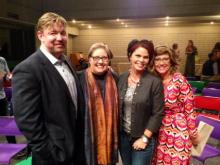
It was a gathering that would have been unthinkable just five years ago.
On a cool summer evening, in a borrowed classroom overlooking San Francisco Bay, about 150 men and women gathered to screen a short documentary about a Mormon family whose 13-year-old son came out as gay.
The Montgomerys, who accepted their son and his news, were ostracized by church members, some of whom refused to accept Communion distributed by the young man in church. Like many conservative Christian denominations, the 15 million-member Church of Jesus Christ of Latter-day Saints bans homosexual activity and considers it grounds for exclusion from Mormon rites, rituals and even the afterlife.

IT’S A TRUISM to say that television is outpacing cinema for entertainment quality and depth of exploration. Since The Wire appeared a decade ago, studios have been realizing that there is an audience for long-form storytelling that is willing to think.
Recently I’ve been struck by the set-in-the-’80s espionage thriller The Americans, the deeply haunting police procedural True Detective, the hilarious pathos of Louie and Veep, and the sly, shocking Hannibal, a prequel to The Silence of the Lambs: All hugely entertaining, dramatically credible, and challenging both as works that require sustained attention and in terms of what they say about life. The Americans is really an exploration of marriage and cultural identity wrapped up in Cold War cloaks-and-daggers; True Detective is a lament for the broken parts of America, and an affirmation that friendship endures above almost everything else; and Hannibal is a postmodern delving into Dante’s Inferno, looking at the underbelly of Aleksandr Solzhenitsyn’s assertion that “the line dividing good and evil cuts through the heart of every human being.”
What’s most exciting is that it’s now considered viable to make drama that actually asks real questions about life and is prepared not to answer them pat. Along with the vast amount of social media conversation about these works, what we have is more akin to ancient forms of public entertainment that required a kind of audience participation—theatrical catharsis meeting gathered conversation to produce a community hermeneutic. When we talk about TV and cinema, we’re talking about ourselves.

For the better part of the last 30 years, my father has been a social justice activist serving as a leader within his Christian denomination, most specifically in various leadership roles where he could be an advocate for anti-racism education, universal health care, peace with justice in the middle East, and for full inclusion of our LGBTQ family within the body of Christ.
His activism actually dates back further, to the early 1960s when he marched with Dr. Martin Luther King, Jr. in Selma, Ala. His work in the 1990s and 2000s reflected a great depth of thought and commitment as he educated himself and others like him about the importance of recognition of the role of white heterosexual privilege in society and the need for collective repentance for ignoring structural sin regarding race, gender, class, and sexual preference. He worked to transform institutions that might inhibit the full expression of personhood for all of God’s children.
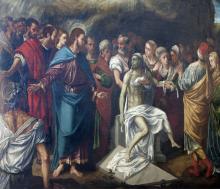
Editor's Note: This post is adapted from a sermon preached by the Rev. Dr. Randle R. (Rick) Nixon.
Some of us have stood at a tomb, faced an open grave, scattered the ashes of one beloved. We know what it’s like to be confronted with the stark reality of death and the flood of conflicting emotions that comes with it. I’ve stood at different sites at Dry Creek Cemetery in Boise, Idaho, and the Veteran’s Cemetery next to it, to bury my father, my brother, my nephew, my step-father and-step sister, my brother-in-law, not to mention my beloved piano teacher, and a dear high school friend. Not so long ago I stood by the open grave of Patrice Heath as her casket was lowered into the ground. We prayed and wept and celebrated her life, but it is not an easy thing, under any circumstances, to lay a loved one to rest.
The ancient story of Lazarus being raised from the dead in John 11:1-45 is just such a situation. It’s also another occasion to encounter Jesus in his divinity and his humanity. It’s a long, complicated story. You have heard it read. I will not attempt to unpack it all.
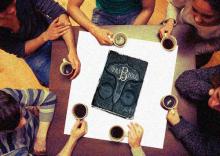
Yesterday morning, an op-ed piece went live on CNN by a young evangelical author named Daniel Darling, titled " Millennials and the false ‘gospel of nice.’ Darling’s piece is clearly written in response to many recent articles — like Rachel Held Evans’ recent piece "How evangelicals won a culture war and lost a generation " — which argue that many of the leaders of evangelical Christianity have abandoned the core convictions and teachings of Jesus Christ and instead have leveraged their faith as a weapon to be used against anyone who disagrees with their political and moral principles that they claim are rooted in Scripture.
All of this is very fresh in our minds as news broke yesterday that Christian relief organization World Vision lost more than 10,000 child sponsorships from people who disagreed with the organization’s policy change on hiring people in legal same-sex marriages. To many who watched this controversy unfold, this is an utter travesty. It seems simply unfathomable that anyone who claims to follow Christ could justify removing support from the impoverished children that they know by name because they disagreed with the organization’s hiring policy.
In his op-ed piece, Darling argues that the cry of many progressive and millennial evangelicals is:
"If only orthodox evangelical leaders would give up their antiquated beliefs, get more in step with the real Jesus, the church and the world would be better off."
He then continues by saying that:
"embedded in this narrative are two presuppositions: Young evangelicals are fleeing the church at a rapid pace [and] the real message of Jesus looks nothing like orthodox Christianity."
When I read these comments in Darling’s piece, I was utterly fascinated. Because as a millennial evangelical, and one who is participating in these conversations on a national and international level, I have never heard a single person call for "evangelical leaders to give up their antiquated beliefs." I have never heard anyone say "the real message of Jesus looks nothing like orthodox Christianity." When I read Darling’s piece, it became crystal clear to me what the key problem is that is causing so much friction between the "old guard" in evangelicalism and us millennials:
The old guard has confused orthodoxy with their political and moral interpretations of Scripture.
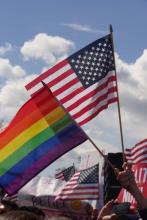
Nearly two years ago, Chick-fil-A CEO Dan T. Cathy caused a backlash when he said he supported marriage between a man and a woman. Gay groups announced boycotts, and Christian consumers rallied around the fast-food chain’s chicken sandwiches.
In a recent interview, however, Cathy said that while he still holds the same position, he regrets “making the company a symbol in the marriage debate.”
Similarly, when Phil Robertson was suspended from his popular reality TV show Duck Dynasty for making controversial comments about homosexuality to GQ magazine, gay groups cheered the decision as evangelical fans swamped the A&E network with complaints. Within a week, Robertson was reinstated.
So it was much the same this week when the evangelical relief group World Vision announced that it would allow employees who are in same-sex marriages. Within 48 hours, the $1 billion Christian organization reversed course, saying on Wednesday that it had made a mistake.

It is easy to see that over the coming weeks thousands of evangelicals will withdraw their support from World Vision. And Dr. Moore is absolutely right. As this begins to take place, thousands of children will suffer because of the lack of funding from their former sponsors who decided that this theological and political issue was more important than their life. It is a sad day when followers of Jesus Christ will chose to make a theological/political point by withholding funds from children in life-and-death situations.
It is indeed a sad day for evangelicalism. It is sad because we have willingly put on blinders to hide our eyes from the truth of the words of our Lord Jesus Christ. We have chosen to ignore the entire example of his life and the bulk of his teachings and instead pick up our weapons and engage in culture wars instead of working to love God and love our neighbors as ourselves, which, by the way, sums up all of the biblical laws. We have chosen to ignore Jesus’ harsh words to the Pharisees who valued doctrinal rightness over the sacrifice of justice that God has always called us to.
LUKE'S SECOND VOLUME, the Acts of the Apostles, tells the story of what happened to Jesus’ followers after they received spiritual power to be his witnesses “in Jerusalem, in all Judea and Samaria, and to the ends of the earth” (Acts 1:8).
Beginning in Jerusalem, the movement proceeds north and west, eventually tracing Paul’s journey to Rome. But the plot takes one big detour along the way, heading south to the mysterious lands beyond Egypt, carried by a person more foreign and unusual than any other in Luke’s vast cast of characters. Only divine intervention orchestrates the encounter between the Jewish Hellenist Philip and the Ethiopian eunuch in Acts 8:26-40.
What is the main thrust of this missionary story? Is it geography—a foray into “the ends of the earth” long before Paul reaches Rome? Is it religious ethnicity—the first God-fearing Gentile believer converting, even before the Roman centurion Cornelius? Is it the man’s undeniable African origins—straight from the lands of Nubia and Cush? Is it his wealth and connections to royalty that will enable him to bring Jesus’ gospel to Africa?
Luke likely included this story for all these reasons, but the text itself points over and over to what must be the driving force of Luke’s inclusive theology in this account—the rider in the chariot is not referred to by Luke as a man. Luke calls him a “court official” and a eunuch (8:27), and later calls him a eunuch four more times, but never a “man.” He has been castrated before puberty and trained to take sensitive positions not entrusted to males. He is beardless with a higher voice. Torn from his birth family and enslaved at a young age, he has no family of his own. Loyal only to his queen, he is “in charge of her entire treasury.”
MOST MEDIA ACCOUNTS of Nadia Bolz-Weber focus on her tattoos. She has the liturgical year tattooed on one arm, from creation to Pentecost; another features Lazarus still wrapped, but very much alive. She got that one while struggling to write a sermon on Jesus’ raised friend.
The tattoos on a 6’1” woman with a taste for punk, a bad-girl past, and a gay-inclusive church—House for All Sinners and Saints in Denver—make for easy picking for secular media. You may have caught Bolz-Weber’s book Pastrix on the New York Times bestseller list. Wise, self-aware, hipster Christian celebrities have a market for books, and she’s tapped it.
In contrast to much of the superficial media coverage, what’s most interesting about Bolz-Weber is her deep traditionalism. “Secular media doesn’t understand the difference between orthodox and conservative,” she tells me through a toothy smile, blue-green eyes blazing over thick-rimmed ’50s-era glasses.
“House,” as the community calls itself, is almost medieval in its liturgy. There are no instruments, just a cappella chant and pillows for kneelers at a prayer station. The Eucharist is served weekly. Eastern Orthodox iconography drapes the church’s interior, stoles, website, and literature. Latin hymns fill the communion liturgy on the Sunday evening I attend. Bolz-Weber is proud to be using Franz Schubert’s setting for the Mass.
This is not high church fussiness; it is liturgical and churchly orthodoxy for scruffy hipsters. Bolz-Weber explains that many of her fellow social progressives want to jettison the Bible and Jesus in order to be more inclusive. “But why should we jettison the only things we have going for us?” she asks.

I have great respect for religion writer Jonathan Merritt, even though we disagree on a lot of social and theological issues. He evoked a maelstrom about his article suggesting the Arizona law allowing businesses to deny service to LGBTQ people was less than Christian, and yet he stands behind his words.
Basically, many prominent voices from the Baptist and Neo-Calvinist camps went berserk about his call for tolerance; never mind that he didn’t even take on the moral issues surrounding LGBTQ identity itself. It was simply enough that he called for equal treatment of all people as fellow human beings, period. But he broke rank with the conservative Christian rank-and-file, which depends heavily on uniformity of voice and position on key issues.
Merritt took a risk, knowing full well that he’d likely suffer for it. And he did. In a small online forum of fellow religion writers, he expressed dismay both at the aggressive, hateful nature of peoples’ response from the right, as well as the relative palpable silence from the center and left.
For that, to the degree that I can speak for myself and others like me, I’m sorry, Jonathan. When someone steps out like this, putting himself at risk, we should rally to support him, as much as those on the right rally behind causes.
Nadia Bolz-Weber's church, House for All Sinners and Saints, is not your typical Lutheran church.
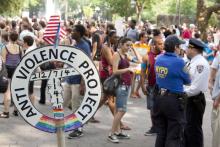
For the second time in Chicago this year, the life of a gender-variant young person of color was lost to violence.
Donta Gooden’s body was found in an abandoned building on the city’s West Side late in the evening of August 14th. Gooden, 19, who also went by the name “Tiffany,” was stabbed to death just three blocks from where Paige Clay, a 23 year-old transgender woman, was shot and killed in April, according to media reports. The police investigation is ongoing.
The tragedy of these senseless killings, still so raw and heartrending for the loved ones of Gooden and Clay, is beyond comprehension and deplorable on every level. But perhaps even more unsettling is how often violent crimes against LGBTQ people occur and how little social outrage they ignite.
For many, these two terrible tragedies may melt into the background in a year when Chicago is scrambling to stem a rising tide of murder across the city (year -to-date homicides are up 25 percent from August 2011 according to data compiled by the Redeye. However, they are part of an alarming trend of violence targeting LGBTQ people of color – and transgender and gender-variant people of color in particular – which directly intersects with the front lines of the HIV epidemic.
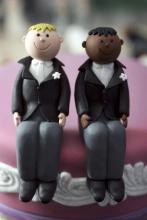
CANTERBURY, England — The British government on Thursday launched a 12-week consultation that is widely expected to lead to the legalization of same-sex marriage in England and Wales, despite strong opposition from Catholics and some Anglicans.
"Should two people who care deeply for each other, who love each other and who want to spend the rest of their lives together be allowed to marry?" Home Secretary Theresa May wrote in The Times of London.
"That is the essential question behind the debate over the government'splans to extend civil marriage to same-sex couples."
The coalition government led by Prime Minister David Cameron and his deputy, Nick Clegg, has made it clear that it wants to see a same-sex marriage law before the next general election in 2015. It is also supported by the New Labour opposition leader, Ed Miliband.
The consultation will also include an option of retaining the status quo and that has met with the approval of senior church figures, as well as a number of Conservative lawmakers.
Atheist activism is hardly news these days. Folks are feeling increasingly convicted about taking their disbelief public, and more specifically, pointing out the damage done by religion.
But it seems the most recent publicity campaign by a group called American Atheists has gone a little too far, even for those not in the religious sphere.
Human rights groups howled when the following billboard appeared in Harrisburg, Pennsylvania:
Following a public uproar, the billboard promptly was replaced with one for the local symphony.
There are some more obvious concerns this kind of campaign raises, while others are more subtle. The point of the billboard is well taken, at least for me; the Bible has some messed up stories and rules in it. But cherry-picking isolated quotes like this from scripture is something that most in mainline Christianity consider a no-no. It’s called proof-texting, and it’s seen as tantamount to using the Bible as a weapon to further a personal agenda.

NORMANDY, Mo. — A popular music teacher at a Catholic Church was fired after church officials learned that he planned to marry his male partner of 20 years in New York, where same-sex marriage is legal.
The teacher, Al Fischer, confirmed that he was fired Feb. 17 from his job of four years at St. Ann Catholic School. When asked to comment on his firing, Fischer declined and referred to a letter emailed to his students' parents shortly after his termination.
In the letter, Fischer tells parents of "my joyful news, and my sad news" — the former being his plans to marry his longtime partner in New York City, and the latter, "that I can't be your music teacher anymore."
Fischer's partner, Charlie Robin, told the Post-Dispatch that the couple's relationship was not a secret at St. Ann, and that Fischer was fired after a representative of the St. Louis Archdiocese overheard him talking to co-workers about his wedding plans.

A small Minnesota church is finding out the high cost of standing up for same-sex equality — as well as an unexpected lifeline from the very people it decided to support.
When the Rev. Oliver White voted in favor of the United Church of Christ's endorsement of same-sex marriage in 2005, 72 percent of his predominantly African-American flock at Grace Community United Church in St. Paul couldn't stand with him.
The UCC's 2005 vote, he said, was "the beginning of the end of many UCC churches." Predominantly black churches like his suffered the most, he said, because the black community "was, and still is, very homophobic."
Because of White's vote, his church developed a reputation of being a "gay church" and people stopped coming. And stopped giving.

It’s bad enough when Christians sit silently by while LGBTQ folks are marginalized, ridiculed, abused, raped or even killed for who they are.
It’s another when Christians actively engage in the exclusion of people based on their identity or orientation.
And then there’s John Piper.
It seems Piper has a Twitter problem. Maybe he doesn’t see it as such, because with fewer than 140 characters, he can stir up quite a storm of controversy. But considering the damage that can be done with so few words, I think it is a significant problem.
